March 11, 2025
Press Release: New eDNA Tool Can Detect Invasive Rodents Within an Hour
New environmental DNA technology can help protect vulnerable island ecosystems from destructive invasive species.
We use cookies to help you navigate efficiently and perform certain functions. You will find detailed information about all cookies under each consent category below.
The cookies that are categorized as "Necessary" are stored on your browser as they are essential for enabling the basic functionalities of the site. ...
Necessary cookies are required to enable the basic features of this site, such as providing secure log-in or adjusting your consent preferences. These cookies do not store any personally identifiable data.
Functional cookies help perform certain functionalities like sharing the content of the website on social media platforms, collecting feedback, and other third-party features.
Analytical cookies are used to understand how visitors interact with the website. These cookies help provide information on metrics such as the number of visitors, bounce rate, traffic source, etc.
Performance cookies are used to understand and analyze the key performance indexes of the website which helps in delivering a better user experience for the visitors.
Advertisement cookies are used to provide visitors with customized advertisements based on the pages you visited previously and to analyze the effectiveness of the ad campaigns.
Looking to make an impact this Earth Month? Here’s how.
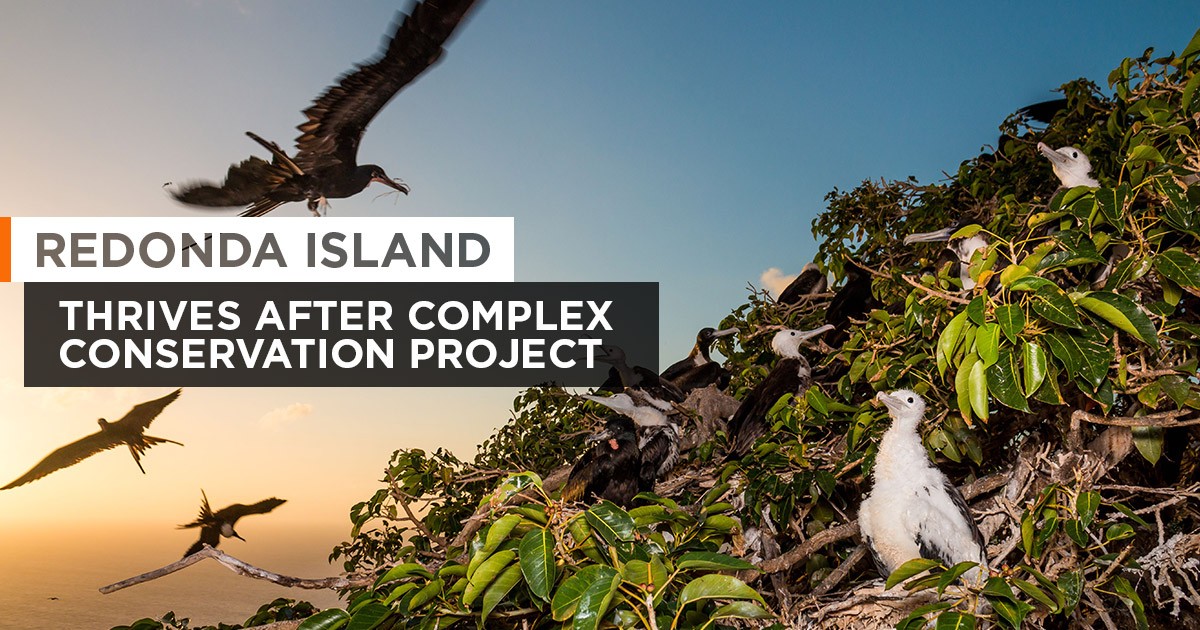
If conservationists had waved a magic wand, the results could hardly have been more spectacular. Within 12 months of starving goats and thousands of ravenous rats being removed from Redonda1, this remote Caribbean island has witnessed a miraculous transformation.
Since the ambitious restoration programme2 was rolled out, the rock of Redonda has been transfigured from an inhospitable lunar landscape to a greener haven. More importantly, the unique plants and animals native to this isolated, uninhabited outpost of Antigua and Barbuda are making a rapid recovery after being freed from an alien invasion.
The evocatively named Redonda ground dragon, a rare black lizard found nowhere else on the planet, has doubled in number – just one of the many fantastic beasts that have been pulled back from the brink of extinction by removing the predatory black rats and plant-devouring goats.
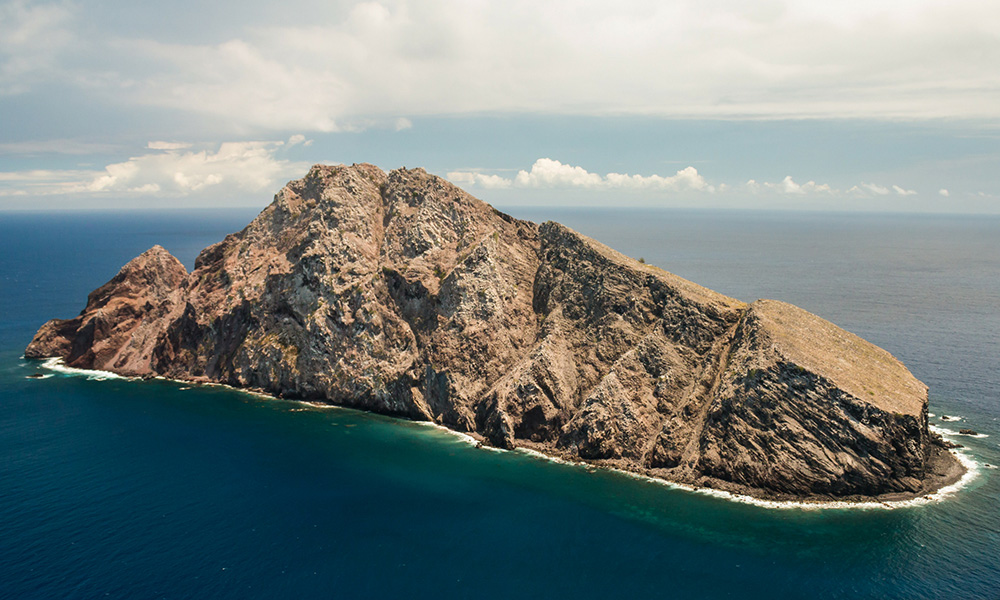
And it doesn’t stop there. In less than a year, numbers of the equally rare Redonda tree lizards have tripled, hundreds of new trees have sprung up, land birds have increased tenfold, and the island’s globally important seabird colonies – including magnificent frigatebirds and several booby species – are having their best breeding year on record.
Speaking on behalf of the Department of the Environment, Dr Helena Jeffery Brown said:
The Government of Antigua and Barbuda considers the return to life of Redonda as a shining beacon in our collective efforts towards ecosystem restoration and biodiversity conservation that will bring us another step closer to attaining some of the Aichi Biodiversity Targets3.”
The project’s coordinator, Shanna Challenger, of the Environmental Awareness Group (EAG) and Fauna & Flora International (FFI), added:
This has been the opportunity of a lifetime – witnessing an island be reborn. Changes forecasted to happen in five years occurred within months. Our conservation efforts really show the benefits of invasive species removal on Caribbean island ecosystems.”
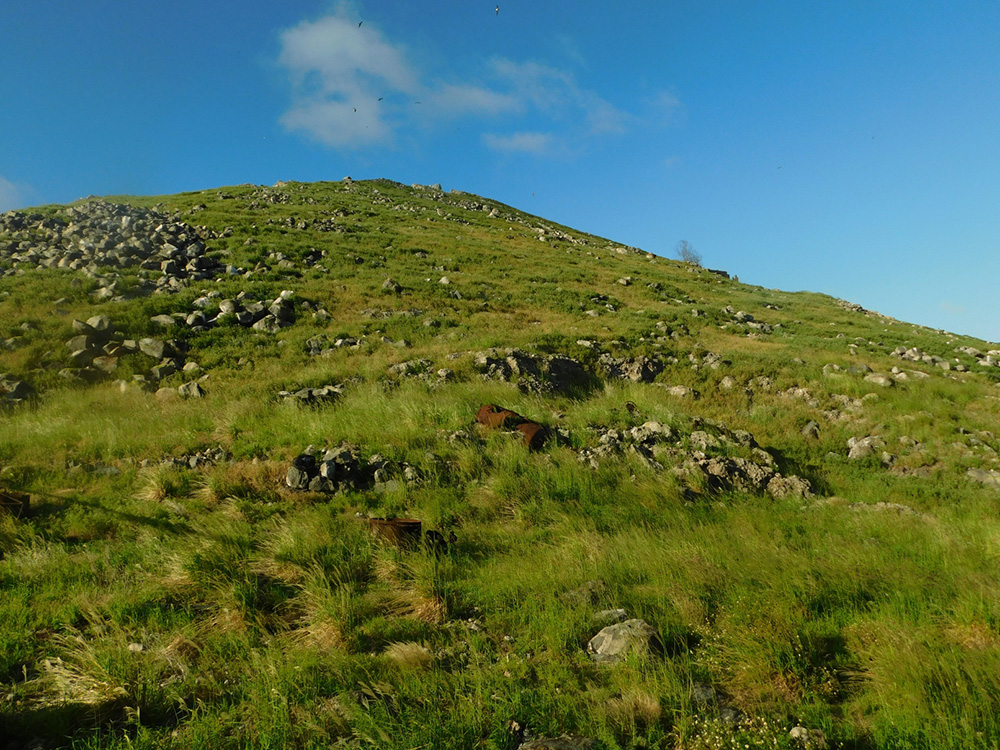
In the field of conservation, where successful outcomes can take years if not decades to materialise, the spectacular results on Redonda appear remarkably swift.
The reality, of course, is that this ‘overnight’ transformation was a long time in the making. It took seven months of blood, sweat, toil and – above all – teamwork to catch dozens of nimble goats and remove over 6,000 rats from every inch of Redonda’s rugged terrain. This Caribbean island makeover involved meticulous planning, ingenuity, and edge-of-the-seat maneuvers that included abseiling down sheer cliff faces to lay down rat bait and, thanks to the skilled pilots of Caribbean Helicopters Ltd, landing equipment in very tight spots.
New Zealand-based Wildlife Management International Limited led the rat eradication team: “We have over 30 years of experience in clearing invasive species from islands,” said ecologist Elizabeth (Biz) Bell, “but having a ground team, rope access team and helicopter team using a combination of bait stations, hand broadcasting and aerial methods to successfully target all of the rats makes the Redonda project unique.”
The British Mountaineering Council (BMC) played a vital role in ensuring that even the steepest cliffs could be reached. Safety was paramount, as CEO Dave Turnbull recalls:
The volcanic cliffs of Redonda presented an extremely challenging environment for the climbers to operate in; the BMC was very pleased to support this important conservation project and help ensure the safety of the team throughout the work.”
The safe removal of the malnourished herd of rare-breed feral goats presented an altogether different challenge, as Dr Karl Campbell of Island Conservation can attest:
This project was essential for the wellbeing of the goats and to enable the ecological recovery of the island. The translocation of goats has seen a suite of positive impacts, and further benefits will unveil themselves in time.”
One intriguing consequence of removing the predatory rats is that lizards on Redonda are rapidly changing their behaviour, according to scientists from Harvard University and the Museum of Natural History in Paris. “We measured anti-predator behaviour and found that the ground dragons are becoming fierce and fearless now that the rats are gone, chasing and eating even adult tree lizards”, said Dr Colin Donihue. “This new balance of nature is more in line with what we’d expect of these animals before rats were ever on the island.”
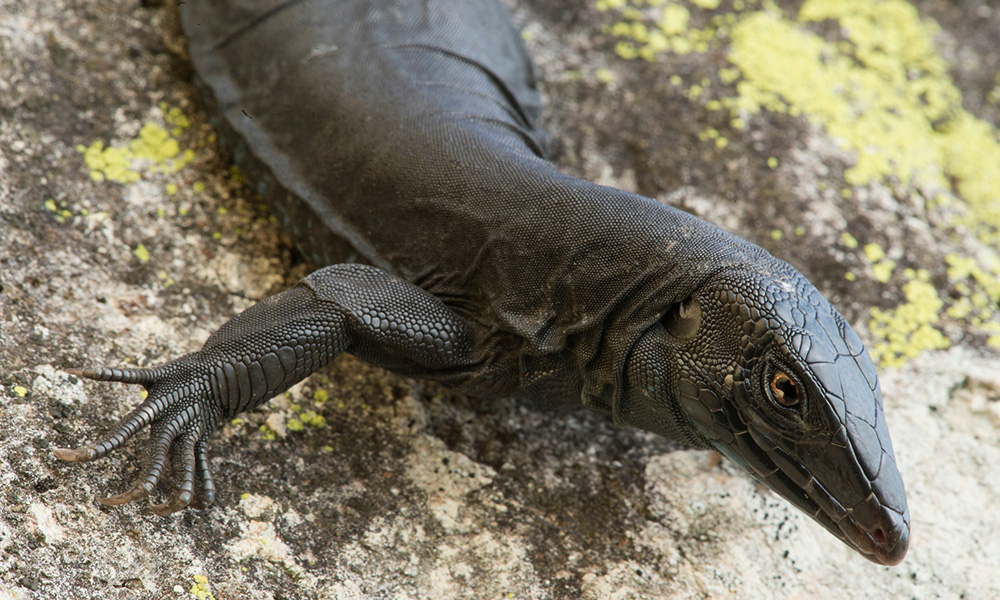
The long list of organisations that cooperated in this mission reflects the complex challenges that had to be overcome. The government of Antigua and Barbuda along with the EAG and FFI joined forces with leading technical specialists from the UK, USA and New Zealand.
Thanks to their collaborative efforts, Redonda has been rat free since March 2017 while the feral goats4 have been rehoused and are being cared for by the government’s Veterinary and Livestock Division on Antigua. Biosecurity equipment and protocols have also been installed to prevent future invasions.
Redonda harbours endemic species that occur nowhere else in the world, including at least five species of reptiles, and globally important colonies of seabirds. Conservationists argue that Redonda’s unique and special wildlife, coupled with the historical remains of one of the region’s largest guano mines, warrants greater protection for the island. They’re not the only ones. A recent nationwide survey revealed that over 96% of Antiguans and Barbudans agree the island should be protected.
Preparations for designating Redonda and the surrounding sea as a reserve are now under way, led by the Redonda Steering Committee, chaired by the Department of Environment.
According to Dr Robin Moore from US-based Global Wildlife Conservation, which has supported this project and is now helping with planning for the protected area, “It’s incredible to see this radical and rapid transformation of Redonda from a bare rock to a carpet of vegetation. As plants and animals continue to rebound, this could truly be a showcase sanctuary for wildlife.”
– END –
High-resolution images are available upon request. For more information and interviews, please contact:
Sarah Rakowski | Head of Communications, Fauna & Flora International | Tel: +44 (0)1223 747 659 | sarah.rakowski@fauna-flora.org
[g-gallery gid=”20595″]
Notes to editors:
[ezcol_1third]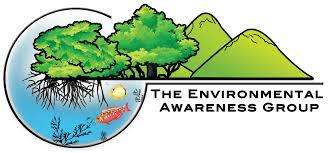
(www.eagantigua.org)
Founded in 1989, the EAG is the oldest national, non-governmental, and not-for profit organization in Antigua and Barbuda whose main focus is the care and longevity of the environment. The EAG strives to develop a society informed and empowered to sustainably use and manage its natural resources. The EAG has partnered with international and local organizations to manage five successful conservation projects, including the multi-award winning Offshore Islands Conservation Programme, and trained and enlisted a large number of local volunteers.[/ezcol_2third_end]
[ezcol_1third]
(www.environmentdivision.info)
The Department of Environment is responsible for sustainable environmental protection and management and the provision of the framework financial mechanism to execute these activities. The Department undertakes coordination of environmental management through collaboration with various government agencies, private persons and NGOs. The Department also coordinates the implementation of several Multilateral Environmental Agreements to which Antigua and Barbuda are party.[/ezcol_2third_end]
[ezcol_1third]
(www.fauna-flora.org)
FFI protects threatened species and ecosystems worldwide, choosing solutions that are sustainable, based on sound science and take account of human needs. Operating in around 40 countries worldwide FFI saves species from extinction and habitats from destruction, while improving the livelihoods of local people. Founded in 1903, FFI is the world’s longest established international conservation body and a registered charity.[/ezcol_2third_end]
[ezcol_1third]
(www.thebmc.co.uk)
Established in 1944, the BMC is the national organisation for climbers and hill walkers in England and Wales, with 81,000 members. It has substantial expertise in all aspects of cliff access and safety and promotes environmental best practice. Chief Executive Officer Dave Turnbull (25 years worldwide mountaineering experience) and Adam Long (founder of industrial rope access company Access Techniques Ltd) conducted the first access and safety assessment of Redonda in 2011.[/ezcol_2third_end]
[ezcol_1third]
(www.wmil.co.nz)
Based in Blenheim, New Zealand, WMIL is an ecological consultancy dedicated to research and conservation of nature. Islands around the world have been devastated by the effects of alien invasive species. WMIL has over 30 years of experience in the eradication of these pests from islands. Due to strict regulations governing the use of rodenticides in Europe and other areas of the world, WMIL developed a ground-based bait station and baiting programme that minimised non-target exposure whilst still ensuring pest eradication. Using these methods we have successfully eradicated mice, rats, feral cats and rabbits from over 20 islands around the world. Usually in partnership with local conservation organisations and resident island communities, these eradications have been the first step in the islands’ restoration, leading the way for species recovery.[/ezcol_2third_end]
[ezcol_1third]
(www.islandconservation.org)
Island Conservation is our world’s only global, not-for-profit conservation organization whose mission is to prevent extinctions by removing invasive species from islands. We work where the concentration of both biodiversity and species extinction is greatest – islands. Removing a primary threat – introduced invasive vertebrates – is one of the most critical interventions for saving threatened plants and animals and restoring island ecosystems. Once invasive species are removed, native island species and ecosystems can recover, often with little additional intervention. Since 1994, IC and partners have successfully restored 60 islands worldwide, benefiting 1090 populations of 399 species and subspecies. IC is headquartered in Santa Cruz, CA with field offices in Australia, the Bahamas, British Columbia, Chile, Ecuador, Hawai’i, New Zealand, Palau, and Puerto Rico.[/ezcol_2third_end]
[ezcol_1third]
(www.globalwildlife.org)
GWC protects endangered species and habitats through science-based field action. It has built its success upon a foundation of excellence in Exploration, Research and Conservation. GWC envisions a world with diverse and abundant wildlife, a truly Wild World. We are dedicated to ensuring that the species on the verge of extinction aren’t lost but prosper well into the future.[/ezcol_2third_end]
[ezcol_1third]
(www.flychl.com)
Caribbean Helicopters Ltd is based in Antigua and has been providing helicopter service to Antigua and the surrounding islands in the Eastern Caribbean since 1996. Caribbean Helicopters specialises in aerial sightseeing tours, aerial photography, external cargo, medical airlift, and assists in aerial search and rescue. We are especially proud to have assisted in this unique project to restore Redonda.[/ezcol_2third_end]
Featured photo: Magnificent frigatebird colony on Redonda. Credit: Ed Marshall
Check out other journal entries we think you might be interested in.
Notifications